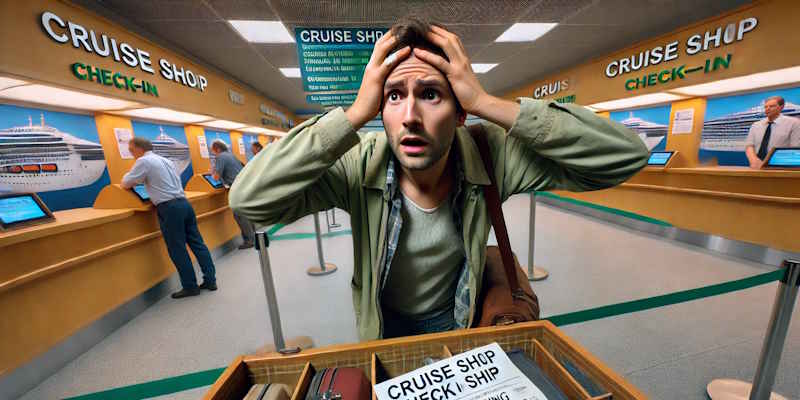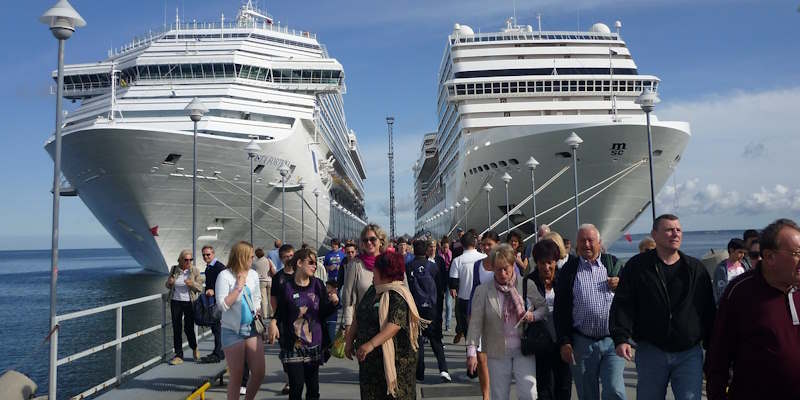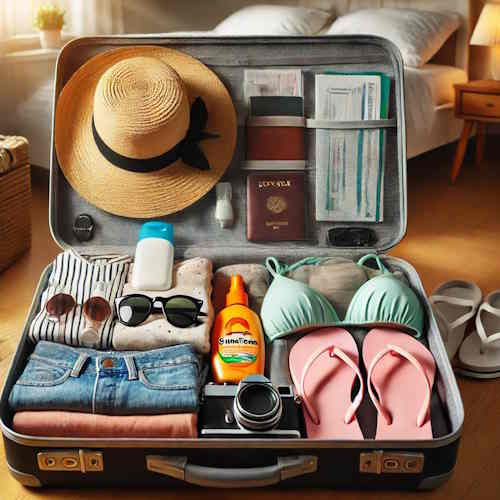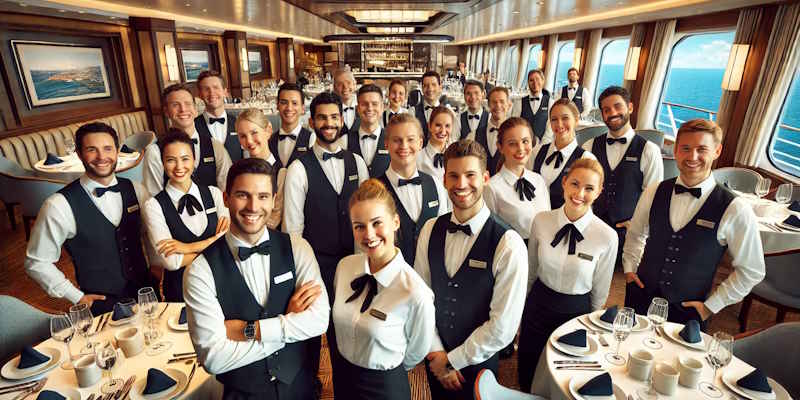Embarking on your first cruise is a thrilling adventure. Your dreams are filled with promises of exotic destinations, breathtaking ocean views, and lazy days by the pool. But turning your dream vacation into a memorable cruise means avoiding common rookie mistakes. Unfortunately, first-time cruisers are often caught off-guard by the realities of life at sea.
Making blunders when booking your first cruise is too easy—you’ve never been at sea on a mega cruise ship with thousands of other passengers. Simple cruise mistakes like overpacking, not budgeting for extras, and eating or drinking too much can set you up for a bumpy ride.
In this article, I want to share my cruising experiences and how to avoid common mistakes first-time cruisers make. I’ve also taken on board comments from other cruise guests to compile a list of the worst mistakes to avoid on a cruise.
So, let’s dive in and make sure your first cruise voyage is smooth sailing from start to finish.
Pre-Cruise Mistakes to Avoid
The excitement of booking a cruise can cause vital details to slip through the cracks. Seasoned cruisers know that careful planning before stepping on board is critical to avoiding unnecessary stress. By avoiding these common pre-cruise mistakes, your perfect cruise can start on the right foot.
Not researching the cruise line

“The best-laid plans of mice and men often go awry.” The famous quote stresses that it’s a mistake to skimp on planning. Many seasoned cruisers say they underestimated the time needed to research the cruise. This includes the typical crowd, onboard facilities, ship layout, itineraries, and what’s included in the cruise price.
Did you know that each cruise line has a different reputation? Royal Caribbean attracts families with kids, Virgin Voyages are adult-only, and Holland America tends to attract an older crowd. So, if you’re looking for a romantic getaway, Virgin Voyages or Viking Cruises may be best because no kids are on board.
To avoid common cruise mistakes, here is a list of things I research before booking a cruise:
- Itinerary and destinations: Plan which ports to visit and for how long.
- Shore excursions: Check to see if shore excursions align with your interests.
- Cabin options: You can save money by booking an interior room, but I regretted not getting a balcony cabin on my first cruise.
- Inclusions and extra costs: Understand what’s included and what’s extra. Drink packages, WiFi, specialty dining, and gratuities usually cost extra.
- Visa and documentation requirements: Ensure your passport is valid and you meet all entry requirements for countries you visit.
Neglecting to use travel agents

Don’t make the typical rookie mistake of underestimating the value of a travel agent. Cruise travel advisors have a wealth of knowledge, and their insider cruise tips can significantly enhance your cruise experience. They have access to exclusive cruise deals, can help navigate complex itineraries, and offer personalized recommendations.
I was glad I booked through a travel agency on my first few cruises. They helped me rebook cruises when prices dropped, gave top-notch advice on shore excursions and cruise ports, and helped me get perks and discounts.
Thinking cruises are all-inclusive

Many new cruisers make the mistake of thinking the initial fare covers everything onboard. However, drinks, specialty dining, WiFi, shore excursions, and automatic gratuities cost extra. I found that these extras quickly add up, adding a few hundred dollars to the total bill. Understanding what’s included and budgeting for the rest is vital to averting unexpected expenses.
To avoid surprises, research what’s included in your cruise fare before booking. Consider purchasing beverage packages, pre-booking shore excursions, and prepaying gratuities. Many well-traveled cruisers will tell you to monitor your onboard account during the cruise closely.
Forgetting to make advance onboard reservations
Newbie cruisers don’t realize how fast onboard entertainment, specialty restaurants, and spa treatments fill up. So, if there’s something you want to do or see on board, book it in advance. It may be a Broadway show on a Royal Caribbean cruise, a luxury spa afternoon, or a fine dining experience at an intimate table for two.
Don’t be disappointed but make essential reservations well before departure. You can then look forward to your cruise with even more excitement.
Booking the wrong cabin

Choosing the right cabin category can be tough on your first cruise. The biggest cruise ships can have up to twenty accommodation types, ranging from inside cabins with no windows to large suites and walk-out balconies.
I would recommend choosing a balcony cabin or stateroom if you can afford it. You will have the unforgettable experience of lounging in the sun and sipping a tropical cocktail in privacy. However, if your plans involve spending most of your cruise out and about on the ship, opting for a cabin without an ocean view could save you money.
Here are some top tips on cabin choice:
- Choose a lower-level cabin if you get seasick
- Cabins under the pool deck or nightclub can get noisy
- Cabins near elevators, stairs, or dining venues can also be by noisy
- To avoid any unwelcome noise from nearby venues, choose a cabin surrounded by other cabins on all sides, including above and below
- Consider more spacious the accommodations if you are a plus-size cruiser. You may wish to avoid inside cabins, which tend to be the smallest.
Not monitoring prices after booking

Do you want to get the best price on your first cruise? In that case, don’t make the blunder of thinking the booked price is final. Cruise prices are dynamic, and they fluctuate. Cruise lines offer deals with discounts, onboard credit, and extra rewards. Failing to monitor prices after booking could mean missing out on potential savings or upgrades.
To help get the best cruise deals, I quickly learned to always sign up for price notifications with websites like Cruise Critic or Cruise Watch. By doing so, I’ve benefited from upgrades and saved hundreds of dollars on cruises.
Skipping cruise insurance

Overlooking the importance of cruise insurance when booking is a mistake many first-time cruisers make. Cruise insurance protects you from unexpected events like illness, trip cancellations, missing your cruise ship, or lost luggage.
Top insurance tip: Don’t assume your regular travel insurance protects you financially on a cruise. It may not cover offshore medical expenses, repatriation, or adventure activities.
Not bringing the correct documents or checking visa requirements

Nothing is more stressful than arriving at the port without the necessary travel documents. You may require visas to disembark in certain ports depending on your itinerary and nationality. Before booking the cruise, check visa requirements for all the countries you visit.
Royal Caribbean website warns that “it is the guests’ responsibility to identify and to obtain all the necessary visas before commencing their cruise.”
Failing to pre-book excursions and activities

Overlooking the importance of pre-booking shore excursions and onboard activities can lead to a frustrating experience. Popular options often fill up fast, especially during peak season. So, waiting until you’re onboard might leave you scrambling for less attractive alternatives.
To avoid missing exciting shore excursions, take the time to research and reserve your top choices. I usually join cruise forums that discuss the places on my itinerary. Over the years, I’ve had terrific tips from fellow cruisers about shore excursions.
For example, one cruiser told me about a trusted independent tour operator at a popular port. I saved around $100 booking the independent option rather than the more expensive cruise line excursion. From comparing notes with fellow passengers later, I realized I also had a more personalized experience.
Overloading your cruise itinerary with too many excursions
On your first cruise, trying to take part in as many shore excursions as possible is tempting. Unfortunately, some have realized this mistake the hard way. They end up getting burned out and cannot enjoy the ship’s amenities. Instead, book a few must-do excursions, leave some time for rest, and enjoy spontaneous moments.
Common packing mistakes

Avoid the biggest mistakes many first-time cruisers make—getting packing wrong. It’s common to overpack or under pack. Remember, cruise ships have limited storage space in cabins. Also, the days of formal wear and tuxedos are long gone in most main dining rooms.
Here are some top tips I’ve curated from various forums to help avoid packing mistakes:
- Skip the formal wear; instead, focus on fun and comfort.
- Limit footwear to essentials like flip-flops, casual shoes, and comfortable walking shoes.
- Use the onboard laundry service to keep clothes fresh.
- The bathroom sink is ideal for washing underwear and socks
- However, always check if your ship has a dress code or themed formal night, and pack accordingly
Here is the best advice I found about what to pack in your carry-on bag to make sure that the first day on board is perfect:
- Only pack the minimum electronics you need.
- Pack a change of clothes for when you arrive on the ship—your bags may not arrive for several hours.
- Keep vital medication, sunscreen, sunglasses, and essential documents in your carry-on luggage.
Common Mistakes Cruisers Make on Embarkation Day and Beyond
The moment you step onto the ship, it’s easy to get caught up in the excitement and overlook some crucial details. I’ve learned through trial and error that a few simple missteps can dampen the experience. Here’s how to navigate cruise day and beyond to avoid the mistakes many first-time cruisers make.
Arriving at the port on embarkation day
Planning to arrive at the port of embarkation on departure day is a risky move. Unexpected delays like bad weather or traffic can lead to missed boarding time, especially with larger ships. I learned an important lesson the hard way—always arrive a day earlier to avoid last-minute unforeseen issues.
The extra day gives you ample time to relax and start your cruise vacation stress-free. You can also explore the embarkation port and start your vacation a day earlier.
Not exploring the ship

Large cruise ships are like floating resort villages, and the number of amenities and activities can be overwhelming. For example, the Royal Caribbean Oasis of the Seas is so large it’s split into seven neighborhoods. Spend time exploring to check out dining options, the poolside grill, fun activities, or a coveted table for dinner.
Take some time on embarkation day to familiarize yourself with the ship’s layout using the daily planner provided.
Not preparing for seasickness

If you’ve never sailed before, you could be surprised that gentle motion causes seasickness for many passengers. It’s a good idea to pack OTC meds for motion sickness. I’ve read that some cruisers swear by sea sickness acupressure wrist bands to prevent nausea during large swells. Remember, having medication and not needing it is better than being caught off guard.
Overindulging in food and drink

Many first-time cruisers make the common mistake of overdoing it in the buffet, dining rooms, or bar. Cruise vacations offer free food and drinks (depending on the drinks package), but overindulging can lead to discomfort. Enjoy the cruise in moderation, staying hydrated, avoiding overeating, and keeping your alcohol intake balanced.
I loved one cruise passenger’s comment, “All you can eat and drink doesn’t mean all you should eat and drink.”
Underestimating the importance of health precautions

Being among thousands of other cruise passengers increases the risk of spreading illness. Failing to follow health and hygiene precautions can lead to catching nasty stomach bugs or colds.
Here is a list of common-sense tips on staying healthy on board:
- Wash hands regularly with soap and water, especially before meals and after using the restroom.
- Use hand sanitizer frequently when soap and water aren’t available.
- Avoid touching eyes, nose, or mouth to reduce the risk of getting infected.
- Drink plenty of water to stay hydrated.
- Get enough sleep.
- Sneeze or cough into a paper tissue (not a cloth napkin) or your elbow to prevent spreading germs.
- Avoid sharing food or drinks to reduce the risk of spreading germs.
- Seek medical help if you notice symptoms of a fever or cough.
Not understanding gratuity policies

Tipping can be tricky for first-time cruisers, especially since each cruise line has different policies. Many lines automatically add daily gratuities, so your tips are already covered.
Luxury cruise lines include gratuities in your fare, so no extra tipping is needed unless you want to go above and beyond. However, if you want to show extra appreciation for exceptional service, having some cash on hand can be useful for giving additional tips to crew members who go above and beyond.
Some lines, like Disney Cruise Line, even leave envelopes for additional tips, which some people find a bit awkward. Still confused? Check out my guide on cruise gratuities for more details!
Assuming all ports are walkable
Some newbie cruisers regret not knowing more about disembarking procedures in every port of call. Some cruise terminals require transportation to the nearest town, beach, or main attractions. Also, depending on the port and number of cruise ships berthed, your ship may anchor offshore and transport passengers ashore in tender boats.
Research each port ahead of time. Plan your cruise line excursions or arrange local transportation before disembarking to spend a day in port.
Top tip from experienced cruisers: For tender ports, booking a cruise line excursion usually gives you priority disembarkation. This can save between 30 and 90 minutes and maximize your time on shore.
Forgetting to manage onboard accounts

Imagine this—after a week of enjoying your dream cruise, indulging in specialty dining, sipping cocktails by the pool, and splurging on WiFi packages, it’s time to disembark. You head to the guest services desk to settle your account, only to be given a jaw-dropping bill as much as your cruise fare.
Unfortunately, failing to monitor onboard spend gives many first-time cruise passengers a nasty surprise. Cruise lines operate on cashless cruise cards, charging all expenses to an onboard account linked to a credit card. While this is incredibly convenient, it can also make losing track of your spending easy.
To avoid this unpleasant surprise, always check your onboard account regularly. This simple step helps you stay within budget and ensures your dream vacation doesn’t turn sour.
Related articles:

